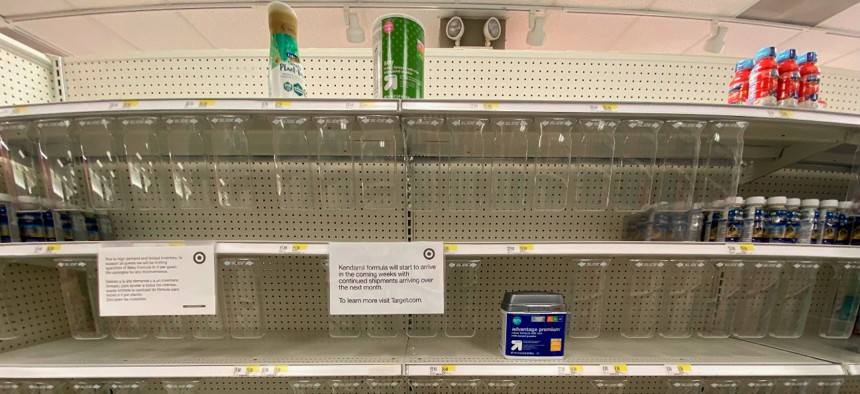
“The FDA’s shortage of investigators, subject matter experts, and compliance personnel with infant formula expertise hinders the agency’s ability to comprehensively inspect infant formula manufacturing facilities, review and evaluate new products, and respond to product concerns or complaints in a rapid manner,” investigators found. Lindsey Nicholson/UCG/Universal Images Group via Getty Images
The FDA’s Internal Review of the Infant Formula Shortage Found Workforce Problems
Staffing shortages and insufficient training contributed to the crisis, investigators said.
An internal review identified workforce issues as one of the pitfalls that hampered the Food and Drug Administration’s response to the infant formula crisis earlier this year.
FDA Commissioner Dr. Robert Califf asked Dr. Steven Solomon, a 32-year veteran of the agency, in May to conduct an internal review of how the agency handled the infant formula shortage following complications at Abbott Nutrition’s manufacturing plant in Michigan and Abbott’s voluntary recall of certain products, which left families and caregivers scrambling. The lead-up and response to this crisis by industry and federal officials has come under intense scrutiny. A whistleblower had tried to bring attention to unsafe conditions at the manufacturing plant.
“There is no single action to explain the events that occurred, rather the report identifies a confluence of systemic vulnerabilities,” wrote Solomon in the introduction to his team’s 10-page report released on Tuesday.
They conducted 43 interviews with a total of 61 FDA employees, who identified several broad areas of concern: FDA needs “modern data systems;” the agency should optimize its emergency response capabilities;” the agency must “strengthen its food workforce” and “work with engaged stakeholders to close scientific gaps and build a more robust regulatory program;” and its “oversight needs to focus on industry accountability.”
One specific finding was that “inadequate processes and lack of clarity related to whistleblower complaints may have delayed the FDA’s response to those complaints,” the report stated. “A complaint sent via mail and other delivery systems by a confidential informant to agency leaders at FDA’s White Oak campus was not delivered to the addressees.”
Another was that despite “robust” training for FDA investigators, there was limited formula-specific training for those who inspect infant formula facilities.
Also related to the workforce, “funding limitations have stalled the growth of the foods program, hindering the agency’s ability to keep pace with the growing workload, increased complexity of supply chains, and scientific and technological changes in food manufacturing,” said the report. “The FDA’s shortage of investigators, subject matter experts, and compliance personnel with infant formula expertise hinders the agency’s ability to comprehensively inspect infant formula manufacturing facilities, review and evaluate new products, and respond to product concerns or complaints in a rapid manner.”
In addition to the FDA-specific issues, the review also found “conditions observed at the Abbott Nutrition facility were not consistent with a strong food safety culture.”
When asked about that comment and the report overall, John Koval, senior director for public affairs at Abbott, said, “We meet and exceed regulatory requirements for infant formula testing and we will continue raising the bar by working with FDA and industry partners to further advance infant formula safety and processes.”
Since the voluntary recall, “investigations conducted by the U.S. Food and Drug Administration, the Centers for Disease Control and Prevention and Abbott, including genetic sequencing, retained product samples and available product from the four complaints, did not find any definitive link between the company’s products and illnesses in children,” he continued. “And, in all four cases, unopened containers of formula in the infant homes tested negative for [the bacteria] Cronobacter sakazakii.”
The investigative report noted that the FDA is lacking “necessary resources and authorities to conduct this critical work” to address recommendations, such as the ability to require manufacturers to notify the FDA when they become aware of a situation that could lead to a shortage of food products. The food program is also lacking modern hiring authorities granted to the FDA’s medical products program as part of the 21st Century Cures Act, the report said.
Califf said in a statement he agreed with the findings and recommendations in the report and noted he also requested a broader evaluation of the FDA’s Food Program, which is being done by an external group led by former FDA Commissioner Dr. Jane Henney and supported by the Reagan-Udall Foundation.
In the meantime, the agency is making “immediate changes,” such as “improving our emergency response structure and streamlining the ways in which the public can contact the agency to report concerns with food products,” he said.
“The situation at the Abbott Sturgis facility has highlighted just how little authority the FDA has to compel many companies to ‘do the right thing’ without intervention,” the commissioner also noted. For long-term stability of the formula supply chain, there needs to be more diversification of the manufacturers and more investment in new manufacturing facilities by formula producers, he said. The companies must also “consistently and continuously adhere to the FDA’s quality and safety standards,” he added.
Additionally, the Health and Human Services Department inspector general is reviewing the FDA’s actions in the lead-up to the formula recall at the Abbott facility. The results are expected sometime in fiscal 2023, which begins Oct. 1.
In order to alleviate the effects of the shortage, one action the Biden administration took was to launch “Operation Fly Formula,” a collaborative effort among the Health and Human Services, Agriculture and Defense departments; the General Services Administration; and the White House to bring formula into the country from abroad. Last week, President Biden announced the 24th Operation Fly Formula mission.
The New York Times reported last week that while the formula situation has improved, it is still not back to normal.
Update: This story was updated at 1:40 p.m. with comment from Abbott.



